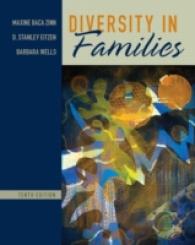- ホーム
- > 洋書
- > 英文書
- > Cinema / Film
Full Description
Remapping Brazilian Film Culture makes a significant contribution not only to debates about Brazilian national cinema, but more generally about the development of world cinema in the twenty-first century.
This book charts the key features of Brazilian film culture of the first two decades of the twenty-first century, including: the latest cultural debates within Brazil on film funding and distribution practices; the impact of diversity politics on the Brazilian film industry; the reception and circulation of Brazilian films on the international film festival circuit; and the impact on cultural production of the sharp change in political direction at national level experienced post-2016. The principle of "remapping" here is based on a need to move on from potentially limiting concepts such as "the national", which can serve to unduly ghettoise a cinema, film industry and audience. The book argues that Brazilian film culture should be read as being part of a globally articulated film culture whose internal workings are necessarily distinctive and thus deserving of world cinema scholars' attention.
A blend of industry studies, audience reception and cultural studies, Remapping Brazilian Film Culture is a dynamic volume for students and researchers in film studies, particularly Brazilian, Latin American and world cinema.
*Honorary Mention - Best Book in Humanities for the LASA Brazil Prize 2021*
Contents
Introduction
Part I
Chapter One: Making Films in Twenty-first-century Brazil
Chapter Two: Engaging With Audiences at Home and Abroad
Chapter Three: Women and Film Culture in Brazil
Chapter Four: Brazil's LGBTQ Communities and Film Culture
Chapter Five: Afro-Brazilian Filmmaking in the Twenty-first Century
Chapter Six: Screening the Indigenous Experience in Brazil
Part II
Chapter Seven: Cinema and Public Security: The Elite Squad
Phenomenon (2007-2010)
Chapter Eight: Lúcia Murat's Olhar Estrangeiro (2005) and the
representation of Brazil on Foreign Screens
Chapter Nine: Hope Springs From Rubbish: Trash (2014) and the
Garbage Aesthetic
Chapter Ten: A Cordial View from Brazil's North East: Kleber Mendonça Filho's Aquarius (2016)
Epilogue








